Peter MALONE
Saturday, 09 October 2021 13:00
Chasing Comets
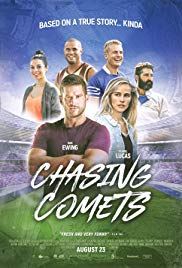
CHASING COMETS
Australia, 2018, 90 minutes, Colour.
Dan Ewing, Isabel Lucas, Kirsty Lee Allen, John Batchelor, Alistair Bates, Peter Phelps, George Houvardas.
Directed by Jason Perini.
This is a slight but pleasantly enjoyable slice of life set in the New South Wales town of Wagga. There is a focus on football, the rivalry between NRL and AFL. The hero of the film is a rugby man and his best friend plays Australian rules.
The central character Base, is played by Dan Ewing (Occupation) who has to go through various personal crises as the football season approaches. He is in love with Brook (Isabel Lucas) but has the reputation of a man about town and falls out with her. He clashes with his friends.
Interestingly, some religious themes and in when Chases at his lowest ebb and encounters quite a religious character, the F and his daughter, with Chase going to church and, reforming his ways, making a vow of celibacy which, of course, captures the headlines.
So, partly expected plot lines but with some unexpected variations.
1. A film from and about Wagga? A glimpse of life in New South Wales? Football life? Town life? Personal lives?
2. The title, Chase as the hero, his belonging to the football team, Rugby League, the Comets?
3. The scenes in Wagga, the country town, homes, football clubs, bars, football matches, media commentary? The musical score?
4. Audience interest in Rugby League? And the competitiveness with Australian Rules? Chase representing one, his close friend the other? Scenes of training, the coaches, the dressing rooms, pep talks, matches, victories and defeats?
5. Chase’s story, his relationship with Brooke, the tension, her backing away, her catching him with the girl at the club? At home, his mother? Talking with his friend and his sexual prowess? His not doing well at the club, in the matches, something having to change?
6. The car breaking down, the Rev and his colourful background, the group and the Bible discussion, Chase and his friend going in, the friend and his scepticism about church and religion? The talk on mercy and forgiveness?
7. Chase, going back to church, the sermons, the Rev and his daughter and her dislike of the friend, fixing the car? Supporting Chase? The effect of religion, the other members of football club laughing at him, provoking?
8. The preoccupation with sex amongst the footballers, explicit jokes, the innuendo throughout the film? Chase and his celibacy, becoming a newspaper headline?
9. Chase and his approach to Brooke, her considering him again, not?
10. The changing fortunes in the club, the improved playing, the wins?
11. The sponsor and his listening to the matches in the diner, the Chinese background, his conversations, ultimate victory?
12. The film star, from Wagga, his vanity, his brother coaching the AFL, the bet? The improvement in the Rugby League competition, the film star present? His victory, his brother prepared to honour the bet, run through the town nude, his admitting he had seen his brother’s films, their both running?
13. The Rugby League Coach, his exasperation, choices, ultimate victory?
14. Chase, success in play, his reputation, church, the Rev and his daughter – their bonding, the marriage?
15. A modest slice of New South Wales country town life?
Published in Movie Reviews
Published in
Movie Reviews
Saturday, 09 October 2021 13:00
Mudbound
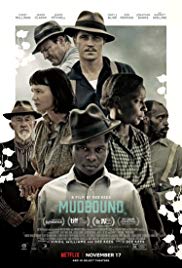
MUDBOUND
US, 2017, 134 minutes, Colour.
Carey Mulligan, Jason Clarke, Garrett Hedlund, Jonathan Banks, Dylan Arnold, Jason Mitchell, Mary J.Blige, Kerry Cahill, Rob Morgan.
Directed by Dee Rees.
Mudbound is a striking film about racism in the American South in the setting of the 1940s in the background of American participation in World War II.
The film establishes the poverty of the south, the farms and the workers, struggles for survival, selling up properties and moving, dependence. This is dramatised in the story of a farmer, played by Jason Clarke, and the tense relationship with his wife, Carey Mulligan.
The war enters into the families both of the wealthy and the poor, young men going to war, their experiences, returning, post-traumatic stress, interactions despite the prejudices of the families.
The film shows vividly the life of the African -Americans in the situations, the parallels with the whites, sons going to war, difficulties on return, prejudice against them – especially in the bitter character played by Jonathan Banks.
The film was written and directed by Dee Rees who had made the small budget film about teenagers, the use and misuse of mobile phones, judgement and their consequences, Pariah (2011). She received an Oscar nomination for her screenplay here. The film also had nominations for music and the original song composed and sung by Mary J Blige who also appears in the film.
1. The reputation of this film? Its impact? For American audiences? Worldwide audiences? The impact for African- American audiences? White audiences?
2. A 21st-century perspective on American history, the 1940s? Mississippi, towns and communities, farmers? The slavery tradition? The places of black and white? The racism? The wall, the war experience, post-traumatic stress disorder, changes because of World War II?
3. The title, the visuals of the mud, the soil and the rain, digging graves, floods? Walking in the mud? The crops and the rain? Stuck in the mud? Mud as a symbol?
4. Races in Mississippi at the time, the inheritance of slavery, the South, African- Americans and their status, socially subservient, segregation and its effect, managing despite the difficulties, suspicious? The contrast with the whites, their status, taking their status for granted, ingrained racism, blood superiority and exploiting it, religious background? Superior? The ordinary whites, and educated, angry and violent? The Ku Klux Klan and torturing?
5. The range of stories, the different voices, the different perspectives, the screenplay and its mixture of the storytelling, the images and the stories, the information, visualising the attitudes of life in Mississippi?
6. Henry and Jamie, the opening with the digging of the grave, their arguments, the flood, Henry saving Jamie? The burial of the Father? The sequence and its recurrence? The presence of Laura and the children? Hap and his family passing by, getting their help? The sequences as a framework for the events of 1940-1946?
7. The range of stories, the different voices, the different perspectives, pieces of the puzzle? The visuals, the sound, the information, the perspectives?
8. The African- American family, their status, poor, in Mississippi? The farm, the large family, making ends meet? Hap, the father, his work, incapacitated, his trying to work, further injury? His wife and her support? The rest of the members of the family?
9. The outbreak of the war? The effect on each family? On the African- American family? Ronsel, his age, leaving for the war? Jamie and his going to war? His dapper personality?
10. The war sequences, the fighting in France and Belgium, the race issues, comradeship? Land fighting? The sequences, bombs, deaths? The effect on Ronsel, on Jamie? Ronsel and the girl, the sexual encounter, later the letter and the news about the son?
11. Henry and Laura, their life, the hard work, the marriage, Jamie’s presence? Henry’s deals, the work, his being swindled, the moving to Mississippi, the hard work, the life, the children? The experience of the war? The relationship with Hap and his family?
12. Henry’s father, the absolute bigotry, criticising Laura, his friends, the drinking, talking? His going with Henry and the family and staying with them? After the war, the taunting of Ronsel, wanting him to go to out the back door of the shop? Reading the letter? The men taking him, humiliating him, torturing him? The Ku Klux Klan the meetings?
13. Jamie on his return, the effect of the war, the loss of friends, jobs? The friendship with Ronsel, spending time together, giving lifts? The bigotry and his father brutality – and Jamie eventually smothering him?
14. Henry, in between, the white status, the treatment of African- Americans, between all?
15. The effect on Laura, over the years, the relationship with Henry? The children? Jamie’s return, her passion for him?
16. The uncertainties of postwar America, Henry and Laura on the farm, Jamie and his leaving, Ronsel and his returning to Berlin to find his child?
17. A film of the 21st-century and its retrospective, perspectives and judgements?
Published in Movie Reviews
Published in
Movie Reviews
Saturday, 09 October 2021 13:00
Little Drummer Girl, The/ 2018
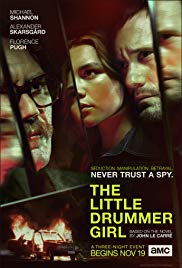
THE LITTLE DRUMMER GIRL
UK/US, 2018, 330 minutes, Colour.
Michael Shannon, Alexander Skarsgaard, Florence Pugh, Charles Dance.
Directed by Chan-wook Park
in 1984, there was an American version of the classic novel by John Le Carre, directed by George Roy Hill and starring Diane Keaton.
In 2018, with the popularity of miniseries, the novel was filmed again, this time by the celebrated Korean director Chan-wook Park, who had achieved a worldwide reputation for a range of films including Sympathy for Mr Vengeance, First, The Handmaiden and the internationally cast, Stoker.
This time the young actress who is persuaded to participate in international spying activities, in connection with Mossad, is British. And, she is played by young star who was emerging at that time, in quite a range of films and performances including Lady Macbeth, Cordelia to Anthony Hopkins’ King Lear, Outdoor King, Fighting with My Family, Midsummer and Little Women. Her character has to go through quite a range of experiences in the miniseries and success depends very much on her.
There is an international supporting cast including Michael Shannon as a Mossad leader living in Germany and travelling to England (Klaus Kinski in the former film). Alexander Skarsgaard is initially charming, meeting the young actress seemingly by accident but then becoming her control. There is a range of character actors in support including Charles Dance and a number of Israeli performers.
The screenplay takes the audience back into the Cold War but also the atmosphere in Israel, the training camps and the harsh discipline, the demanding undercover tasks which take their toll on the participants.
One can commend the miniseries in its doing quite some justice to John Le Carre’s original novel and perspectives on the era and espionage.
1. The popularity of the books, films and television adaptations of the work of John Le Carre? Espionage, secret services, international?
2. The focus on Israel and Palestine, the late 1970s, early 1980s? Audience knowledge of the events, the perspectives, the audience taking sides?
3. The adaptation to a miniseries and extended episodes in comparison with the feature film version? The possibilities in this version?
4. 1948, the state of Israel, 1967, the Six-Day? War, Israel as a nation, the attitude of the Zionists, patriotism, religion? The Palestinians, dispossessed? The development of the PLO, the traditions of war and terror?
5. The picture of the operatives for Israel, Marty Kurtz and his story, Michael Shannon and his presence? An official, his authority, his innate shrewdness, the range of his staff, their personalities, men and women, working with them, moving internationally, making decisions? The interactions? His friendship with Gardi, using him? The scenario with Charlie, authorising the interrogation, her virtual abduction, her choice to join the mission?
6. The portrait of Charlie, Florence You and her performance, young woman, her acting, her false stories about her family background? Belonging in the group, outspoken, performances, Joan of Arc? Her acting and identifying with the characters? Going to Greece, the holiday, on the beach, meeting Thomas, the attraction, his being enigmatic, her friends and their urging her on? The trip to Athens, the night on the Parthenon, the relationship? The Israelis observing her?
7. Thomas, his posing, Gardi, his cover, the background, recruiting Charlie, the visit to the Parthenon, the attraction, yet his being enigmatic, the secrecy?
8. Charlie, the confrontation, her reaction, the pressures on her? Encounters with Rachel and the other female agents? The research and scenario expert? The range of male agents? The explanations, the scenario, her motivation, choice?
9. The background of the terrorists at the time, Salim, his brothers and sister, the network? The initial bombing, the child in the English country home? The filming of the terrorists? Arresting Salim, his being confined in the cell, the interrogations, his treatment, the agents, the meals, psychologist? His being let out, wanting the information from him, his girlfriend’s death, the Israelis and their promises? Wanting his brother? The bombs, their transport, wanting the destination, his giving it? Arranging his death in the car?
10. The scenario, Charlie and his Salim’s girlfriend, the extensive training with Gardi, her writing the letters, their manufacturing the correspondence, the dates and details, Charlie identifying with the girl? The task, transporting the explosives, delivering them, the Israelis intercepting the messages, Austria as the destination? The drive, the explosives in the car, her not smoking, the interrogation by the police?
11. The device of Charlie going into action, but the frequent flashbacks to the situation, the training, Gardi as Salim? Charlie in action, heeding the advice, going back to the training situations, knowing the pointers that would preserve her identity?
12. The credibility for Charlie as Salim’s girlfriend, her knowledge, even to knowing how to shoot on his advice? Helga, the other agents, coming to see her, testing her? Her ingenuity in keeping her cool?
13. England is the target, terrorist bombings and other capitals?
14. Charlie, the Israelis not giving her full information, trusting her to make the right decisions? The credibility of her transformation, meeting Salim’s sister, the doctor, the tests? Buying the guns? Believing her, transforming her, the clothes, going to the military camp, the life there, the details of the training, the ideology? The discussions with the sister?
15. Her going to England, Helga’s presence, her meeting the brother, the discussions with him, her admiration for him, the plan for the bombing, her letting Gardi she is one? The delivery of the bombs? The dealings with the professor? The staged explosion, carrying out the body to the ambulance, the credibility?
16. Charlie, going back to the house, with the brother, the effect, the admiration, the sexual encounter, yet the truth?
17. Gardi and the other agents, approaching the house, the attack, the brother and the confrontation, his death?
18. The mission accomplished? The Israeli team and the sense of achievement? Yet Gardi and his anger, about the treatment of Charlie? Her going to Berlin, finding him, with him?
Published in Movie Reviews
Published in
Movie Reviews
Saturday, 09 October 2021 13:00
Anon
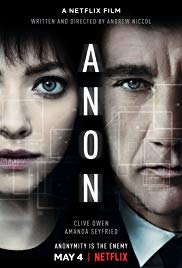
ANON
US, 2018, 100 minutes, Colour.
Clive Owen, Amanda Seyfried, Colm Feore, Rachel Roberts, Sebastian Piggott.
Directed by Andrew Niccol.
Perhaps the main draw for audiences for Anon is the fact that it was written and directed by Andrew Niccol who made such an impact 20 years earlier with his science-fiction film, Gattaca. He also directed quite a range of films including The Lord of War, In Time, The Host, Good Kill, as well as writing screenplays for The Truman Show and The Gemini Man.
In many ways, the science-fiction is presented in Anon in a low-key way though for human existence, the premises are highly significant. The science fiction is that everyone is under surveillance, that there are data-records that can be used in all kinds of ways for safeguarding as well for manipulation.
Clive Owen, in his kind of world-weary mode, plays a detective who is trying to uncover a murderer, using the data, but encountering a young woman who enters into his life who has no data footprint, Amanda Seyfried. The atmosphere for the film is not action but tension in exploring each of the characters and their interactions.
Andrew Nichol usually offers science-fiction or futuristic scenarios which are not meant to be adventure stories but rather reflective experiences.
1. Futuristic science fiction? Internet and surveillance? Crime and detection?
2. Work of the writer-director, from the 1990s on, imagining the future? Science fiction – and a touch of the apocalyptic?
3. The outlines are familiar city, the buildings and landscapes, the river, suburban streets? The interiors of offices, apartments? The musical score?
4. The technical aspects of the film? The frames and the information about everyone in the street, the background, their business? The extent of the files? Are being photographed? Stored in archives? They’re being examined, the importance of hacking, of eliminating memories, of fabricating memories, of forcing people’s focus, controlling what they saw, real and imagined? Memories of George Orwell in 1984 and B Brother, and the society going well beyond? The possibilities for policing and control? The possibilities for hacking, manipulation?
5. The focus on Sale, Clive Owen at his most serious, as a detective, for such a surveillance society, concerned with crime? The scenes of his walking the street, the audience seeing what he saw, the audience seeing all the information about the people that he passed? His own personal life, the separation from his wife, the death of his son, his going back to the images and has memories, indicating with his wife, her wanting to leave the past in the past?
6. So will and his professional work, the team, their personalities, future police and detection work? The interactions, the meetings, speculations? They’re watching the files? The murders and deaths, the end of files? The range of expertise, the up-and-coming experts?
7. Sal and his seeing the woman in black, no information about her? The range of deaths, the characters, their life files, their crimes, the hand in the black glove, the shootings? The visitor asking to see the file of his son, is standing on the edge of the building, falling to his death? The use of such files?
8. Sal and the decision for him to go undercover, as a businessman, creating his memories, changing his name? Wanting the woman to make contact? Sal and his sexual behaviour, the woman, the encounter with her out information to contact the killer? For eventually coming, her signature, Anon? Eventually meeting, her personality, her demands, cash? The lack of personal life?
9. Sal the case, the woman and her being able to raise memories, change memories, and kill the unwelcome contact? The alleged non-traction, the growing attraction, their meeting, the apartment, the sexual encounter and the consequences?
10. The reaction of the police, the discussions with the chief, Lester and his talent? His being part of the undercover plane, the woman discovering him, killing him? The effect on Sale?
11. The woman infiltrating cells memories, changing, eliminating memories of his son? The interactions between the two, her playing psychological games? Her altering his memories, his fantasies, the corridor on fire, shooting the neighbour? The police and their apprehension, Lester’s death, Sal being suspended, yet his hallucinations, the episode in the street with the car, being told all is clear and his crashing?
12. Sal becoming more desperate, the contact with the woman? The revelation that she was being manipulated? The showdown, the apartment, the guns, shooting? The young expert and his hacking and control? His death?
13. The film as a warning fable about the use of surveillance, the abuse of surveillance, his possibilities, making files on everyone, photographic and film files, archives – and they’re being manipulated? Ominous for the future?
Published in Movie Reviews
Published in
Movie Reviews
Saturday, 09 October 2021 13:00
Dragged Across Concrete

DRAGGED ACROSS CONCRETE
US, 2019, 159 minutes, Colour.
Mel Gibson, Vince Vaughn, Tori Kittles, Michael Jai White, Thomas Kretschmann, Jennifer Carpenter, Laurie Holden, Don Johnson, Udo Keir, Fred Melamed.
Directed by S.Craig Zahler.
This is a very strong police drama. It has received strong critical support but damning blogs from several hundred trolls on the IMDb. This review is in support of the critics.
This is also quite a long film, taking its time in introducing characters, building up situations, inviting the audience to be patient observing, sharing a long wait in a stakeout, quite a number of stakeouts in fact, spending a lot of time in getting to know characters (and wondering where they will fit into the overall scheme), sitting in cars with the central two police officers, watching, waiting, following at a distance – and then, a grim, sometimes gruesome, climax to the whole film. Although, there is a moment’s cheerfulness just before the final credits.
It is hoped that the previous paragraph gives some indication as to whether the film is one that would be sought out or avoided. While no character is dragged across concrete, this gives a tone to the film – ‘knife held cutting through intestines to find a swallowed key’ might be too grim a title but it would be more accurate!
The writer-director, novelist, band member, writer of songs and musical scores, S.Craig Zahler, is a cult director for some enthusiasts. His two previous films were strong and striking, each with visceral titles, Bone Tomahawk and Brawl in Cell 99.
The central focus of the action is on the two policeman, very old school, tough, staking out an apartment, brutal treatment of a suspect (filmed on video with the reports sent to TV networks to expose police violence). They are played by a very serious Mel Gibson, supported by Vince Vaughn. They are suspended, both needing financial support, especially Gibson’s Ridgeman whose wife is a former police officer but incapacitated, living in a very rough neighbourhood where his teenage daughter is routinely attacked. Vaughn’s Tony, on the other hand, is investing in a diamond engagement ring.
We have first been introduced to Henry (Tori Kittles) getting out of prison, confronting his mother who was living by prostitution supporting his younger disabled brother. But, Henry keeps his criminal contacts and goes into action. Ridgeman also wants to go into action, makes contact with a secretive criminal boss and stakes out a suspect, thinking that it was drug dealing but, in fact, as we see, it is an elaborate bank robbery, taking gold, but leaving dead behind.
The aftermath of the robbery, the pursuit of the getaway car, the long drive along the highway to a rendezvous, all bring the characters together for a final confrontation which is not all as might have been expected (except for the vicious and violent confrontations).
The cinematography is dark along with the themes. Performances are strong, the action dramatic even as it slows in pace. One of the most interesting features of the screenplay is that it is practically four-letter-word-free, the writer taking the trouble to actually write dialogue, dialogue which includes some rather upmarket vocabulary choices (assuage, endeavour, metaphysical…), A reminder that intelligent dialogue is preferable to lazy swear-substitute writing.
So, not for everyone, but certainly for those interested in genre, especially police genre, portraits and action.
1. The title? The tone?
2. A dark film, the lighting, the tone? Crime, consequences? Police, action, violence?
3. The American city, the neighbourhoods, apartment blocks, police precincts and offices, the streets, highways, warehouses, bank, the location for the final climax? The river? The graves? The musical score?
4. Introducing Henry, getting out of jail, the sexual encounter, going home, the confrontation with his mother, ousting her client, his concern for his handicapped brother, playing computer games? Yet keeping his crime contacts, the discussions, going to work, vehicles and security, his friend, driving the getaway, the chase, the climax, his escaping to the roof of the building, the confrontation with Ridgeman? And a happy ending with the mansion for his mother and brother?
5. The two police partners, veterans, their experience, their violent style, the stakeout, the tactics, the man escaping through the window, Ridgeman and his foot on his head, threatening the girl, arresting her? The information? Their being videoed? The video sent to the media, the denunciations, the interview with the boss, Richman’s past partner, suspension?
6. Richman, his relationship with his wife, her being a former officer, her handicaps? His daughter, harassed in the streets? The need for money? An idea, making the contact with the shadowy boss, getting the information for a case?
7. Tony, his age, working with Ridgeman, buying the ring, his fiancee, the meal together, the invitation to partner Ridgeman, saying he was in until he was out? The questions? Agreeing?
8. The apartment, the stakeout, Tony eating, Ridgeman smoking, waiting? Phone calls? The arrival of the dealer? Contacts, plans?
9. The garage, the vans, the drivers, preparations for the robbery?
10. The story of the wife, anxious about her child, her husband and the chain on the door, attaching the baby, going to work, the staff meeting her, little shrine to her child, the suave manager, the robbers arriving, the reactions, whether to fund the police on not? The shootings, the taking of the gold, the dead bodies, her being taken hostage, in the back of the vein? Her being sent out to shoot, her death?
11. The following of the getaway van, the long drive, the drivers, their masks, the crew in the back with the gold? The long drive, the conversations?
12. The arrival at the destination, dark, the issue of the key, Henry, his escape, his companion being shot, swallowing the key, his death, the detailed probing of his intestines for the key, the siege in the van, the police attacking, Tony being shot, his having left the message for his fiancee? His death? The buildup to the confrontation between Henry and Ridgeman, using their wits, guns? The decisions about the gold?
13. The bodies, the new car, the guns, Richman being shot, his death? Concerned face family?
14. Henry, the gold, bearing the bodies?
15. The a script, the gold sent to Ridgeman’s wife?
16. The mansion for Henry and his mother and brother?
Published in Movie Reviews
Published in
Movie Reviews
Saturday, 09 October 2021 13:00
Vessel, The
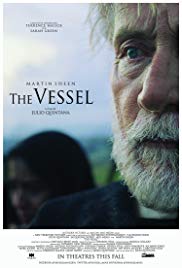
THE VESSEL
US, 2016, 84 minutes, Colour.
Lucas Quintana, Martin Sheen, Jacqueline Duprey, Aris Mejias.
Directed by Julio Quintana.
The vessel in the title is actually a boat which the central character, Leo, Lucas Quintana, builds out of the wreckage of a school which was destroyed by a tsunami 10 years earlier, the tsunami killing all the children in the school, deaths and the devastating effect on the adults in their survival, their Catholic tradition, the loss of faith, loss of practice of their faith
.
This is a first feature directed by Julio Quintana, from Cuba to the United States, studying under Terrence Malick (who executive produced this film). The film was made in a Spanish version and an English version, filmed on the coast in Puerto Rico. The use of the locations and scenery is quite striking.
The central character has survived in the community, but his mother has withdrawn into herself. He is a good friend to his younger brother but the two of them, drinking, sit on a wall at the water’s edge, fall in and are drowned. But, after three hours, Leo is alive – a miracle for the people but they are fickle, supporting him, then when he builds a boat out of the wreckage material from the school, they turn against him and burn the boat. He is encouraged by Fr. Douglas, the parish priest, who came just before the tsunami and has tried to serve the villagers who have abandoned church practice. He wants to use the vessel as a symbol but the villagers burn it.
The climax of the film is people helping to push the boat to the shore then carry it, watching Leo save it but its sinking – and his mother coming out of her own world going into the water to save him and embracing him.
Faith, despair, religious tradition, the role of the priest (yet another sincere performance as a priest by Martin Sheen), the possibility and consequences of miracles.
Audiences who like this film may be interested to see the Chilean film, The Blind Christ, which has associated themes.
1. The film as a religious parable? The symbolism of the vessel itself? Leo?
2. The filming in Puerto Rico, the coast, the sea, the village, homes, streets, the church? Authentic feel? The locals involved in acting? The first film by the writer-director?
3. The religious background, Catholic traditions, faith, practice, doubt, rituals, the role of the priest? Belief in miracles?
4. Leo, his explanation of the situation, the experience of the tsunami, all the children killed in the school? His younger brother killed? His mother living in her own world, refusing to communicate? The friendship with his other brother, fixing the bike for him, the conversations, drinking, on the wall, falling into the water, drowning? The two coffins in the church?
5. The miracle, after three hours Leo rising from the dead, in the cloth, pursued? His acceptance of his experience?
6. Leo, in the village, the villagers thinking it a miracle, yet fickle? His collecting the debris from the school, building the boat? The people’s antagonism? Ultimately setting it on fire? Father Douglas, scepticism about the miracle, about building the boat, his change of heart, wanting it near the school, a symbol for the people?
7. The people in the village, the Deacon, the men, relying on Leo, turning against him? The range of women? The young couple becoming engaged and changing their mind? The young woman, interest in Leo, the dress, coming to the house, the meal, the reaction of Leo’s mother? Leo sleeping, her touching him? Her disappointment, the touch of disillusionment, hearing the noise, running to the shore?
8. Leo, ordinary, with his family, experiencing the disaster, living in the village, working? The building of the boat? His expectations, Fr. Douglas encouraging him, the people turning against him, the burning of the boat, Fr. Douglas trying to extinguish the fire?
9. His decision to launch the boat, the donkey, everybody watching, the donkey refusing to move, his letting it go, the various people coming to help him pull the boat, the rubble on the beach, everybody carrying the boat? Launched, Leon on the boat, the waves, everybody watching, the gradual sinking, sail, the boat?
10. Leo and his swimming, to the buoy, his past story about his mother swimming to rescue him? Her coming out of her world, calling out to him, into the water, swimming to rescue him, the embrace?
11. The character Fr. Douglas, in the parish, people not attending after the disaster, it is presence, support, advice, his own life and prayer, Leo is rising from the dead, his reaction, encouraging Leo, the boat, the fire?
12. The impact of these events on the village and the lives of the villagers? Miracles and faith?
Published in Movie Reviews
Published in
Movie Reviews
Saturday, 09 October 2021 13:00
Pottersville
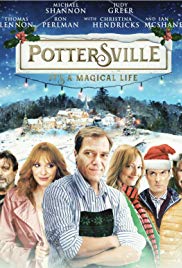
POTTERSVILLE
US, 2017, 84 minutes, Colour.
Michael Shannon, Judy Greer, Ron Perlman, Christina Hendricks, Thomas Lennon, Ian McShane?, Blake Perlman.
Directed by Seth Henrikson.
There is a rather enjoyable brief comedy drama. Yes, a lot of it is rather silly. But, yes, there is a nice humanity about it along with atmosphere of spoof. The title, of course, comes from Frank Capra’s It’s a Wonderful Life, the happy atmosphere of Bedford Falls, James Stewart as the straight up-and-down American hero, falling on hard times, imagining Bedford Falls transformed into an ugly town, under the power of the banker, Pottersville.
It is something of a surprise to see Michael Shannon who can be a frightening villain doing a quietly comic turn, a 21st-century James Stewart character, stalwart of the small town, kindly in his dealings with customers at the store.
He suddenly finds his wife unfaithful to him with the local sheriff (Christina Hendricks and Ron Perlman) belonging to a sex club, the Furry Club, with the members dressed up as animals. Dismayed, Maynard drinks, get out his Bigfoot costume and roams around the town.
The comic point is that the inhabitants all believe Bigfoot is around. They go in search, industries start-up, tourists arrive, television arrives – especially in the form of an obnoxious host played by Thomas Lennon. His accent is mid-Tasman, touches of Australian and New Zealand accents and, when he says Crikey, it is a spoof on Steve Irwin and his programs. Underneath, he is actually an American huckster. Ian McShane? enjoys himself as a hunter.
Maynard is caught in his hoax, is happy that the town is prospering, his identity however being revealed, everybody turns on him but his devoted store assistant, Judy Greer, reminds everybody of their debt to him and he is welcomed once again (except for his wife whom he quietly tells that they are separating).
An easy and pleasant 84 minutes mixture of the serious and the comic.
1. The title? The reference to It’s a Wonderful Life? From Bedford Falls to Pottersville? From contented community to exploited and depressed community?
2. The average American town? Its look, driving in, in winter and the snow, the buildings, the store, the storeroom? Outside the store, the gatherings? Out in the woods? The musical score? The range of Christmas songs contributing to the mood?
3. The film as comedy? Broad comedy and farce? Satire and spoof? Superstitions about Bigfoot? Public gullibility? The satire on television programs and personalities?
4. Maynard, age and experience, the family owning the store, his kindness, delays in paying debts, candy to children, the revelation that he had no debts in his book? His enthusiasm, Parker as his assistant, her loyal support, relying on her? Bart, hunting, the meet? Maynard going home, surprising Connie and sheriff Jack, the disguises, the Furry Club? His disappointment and shock? Returning to the store, finding his Bigfoot costume, drinking, putting it on, roaming the town? The people and their sightings?
5. The response of the population, believing in Bigfoot, testimonies, the media and the interviews? All wanting to see Bigfoot and hunt it? The arrival of Masterton, his false Australian accent, Is Patter, self-importance, his song, dealing with people, prima donna behaviour with rehearsing his lines, insulting people, his producer, the powers of persuasion? Powers that be, the decision to hunt? The sheriff wanting to go? Meeting with Bart? His conditions?
6. Maynard and his reaction, serious, wanting to tell the sheriff, getting cut off? His decision to continue? Seeing everybody happy? Signs of hope? Connie and her excitement? Parker and her disbelief, suspicions, finding the costume, trying to help?
7. Going on the hunt, the dart subduing the sheriff, Bart and his comments, coyotes? Masterton and his pretentiousness? Filming? Maynard coming out, the dart, unconscious, on the truck, the revelation, Parker and her intervention? Masterton and his dismay? Reaction of the people, the denunciations?
8. The television interview with Maynard, his confession, his wanting hope for the town? Parker and her talking to the crowd, how Maynard waived their debts, the good of the town? Their all coming back? The further television interview – and hope for Christmas? Everybody being nice? The deputy and her repeating all the sheriff’s orders, coming back to apologise?
9. Bart, the commonsensed man? His reaction to the Furry Club and ordering them off? Masterton enjoying the attention?
10. Connie, wanting to bask in Maynard’s reputation, his quietly telling her that they should separate? Her huff?
11. Maynard, continuing his life in the town, with Parker, a happy ending?
Published in Movie Reviews
Published in
Movie Reviews
Saturday, 09 October 2021 13:00
Little Women/ 2018
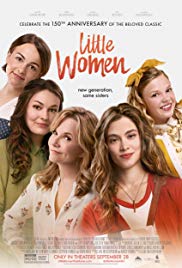
LITTLE WOMEN
US, 2018, 112 minutes, Colour.
Sarah Davenport, Leah Thompson, Allie Jennings, Melanie Stone, Elise Jones, Lucas, Gabreel, Taylor Murphy, Ian Bohen, Bart Johnson, Barar Heiner, Stuart Edge, Michael Flynn.
Directed by Clare Niederpruem.
This is a 21st-century adaptation of Louisa May Alcott’s classic novel. It is probably best for those who have not read the novel or seen previous film and television versions, of which there have been many, with Katherine Hepburn in the 1930s, MGM gloss in the 1940s, several miniseries, and Greta Gerwig’s 2019 version.
While there have been many updatings of classic literature – especially with Shakespeare, they have been of mixed quality. One of the strengths of the novel and previous film versions is the sensibility of the US at the time of the Civil War, 19th-century styles and manners, a family with decorum as well as energy, hopes and ambitions. The characters, the sisters and Marmee were very much of the time.
While some audiences may well enjoy this version, for those who remember the classics, the treatment seems too modern, at times too trite, a shift from 19th-century language which has some gravitas to contemporary American culture, slang, popular expressions, music, dates, dancing, making the March sisters much like any other teenagers and young adults.
While there is an atmosphere of niceness in the house, with Leah Thompson as a youngish and nice Marmee, father away on duty in war, there is nothing much to distinguish the sisters from any other family (with Paulist movies and other religious and moral groups financing the film, it might have been more, more substantial, a touch deeper…).
The character of Jo, always strong in the novel and in the various screen versions, is the exception here. She is played with some energy, at times over-energy and rage, by Sarah Davenport. While audiences might warm to her energy and ambition, she can be most exasperating to watch and listen to, losing her cool (her phrase “freaking out�, not Alcott’s), demanding and harsh on her sisters, dominating and demanding, especially Amy who (not necessarily unreasonably) takes revenge by tossing Joe’s journal into the fireplace. Her behaviour in the hospital when Beth is diagnosed with cancer (freaking out again) is reprehensible more than understandable.
The framework of the film is a focus on Jo in the present with a range of flashbacks to the life of the March girls and their interactions. The other three sisters are pleasant enough. And the young men are quite genial, Jo going into one of her tantrums when Meg wants to marry the neighbour. Jo is also writing novels, goes to theatrical performances, relies on the Professor for comment but goes on the defensive about her work – eventually finding that it is only by writing about her family that she will achieve success, and find love with the professor.
It seems rather harsh to say, but time would be more profitably spent with other film and television versions.
Published in Movie Reviews
Published in
Movie Reviews
Saturday, 09 October 2021 13:00
Conversations with a Killer: The Ted Bundy Tapes
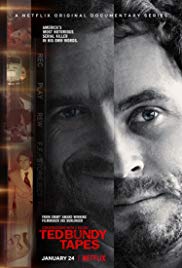
CONVERSATIONS WITH A KILLER: THE TED BUNDY TAPES
US, 2019, 210 minutes, Colour
Directed by Joe Berlinger.
Writer-director, Joe Berlinger, is an award-winning documentary maker. But, he also made the feature film, a companion piece to these documentary studies about Ted Bundy, Extremely Wicked, Shockingly Evil and Vile (starring Zac Efron as the serial killer).
There are four episodes in this series, very well researched, offering a great deal of data, contemporary footage, interviews, developments of police procedures at the time, the detection work to uncover Bundy.
The impact of the film will depend on audience knowledge of Bundy himself and his killings in the late 70s and early 1980s, the court cases, his imprisonment, his eventual execution in 1989. For those aware of Bundy, this offers comprehensive information and understanding. For those who have not been aware of Bundy, it will be probably quite shocking, the probing of the psyche of such an externally charming man – with the title of the first chapter, Handsome Devil.
The series offers a great deal of information about Bundy, his background, his family, his behaviour as a boy, his studies, the religious background. It is hard to tell whether there are were indications when he was young of what he would do.
There are many interviews with the police, those investigating the crimes at the time, the detectives and their work. The film then works step-by-step over the years gradually exposing Bundy. There are interviews with family, especially parents, his wife.
The film details a number of the cases, footage of the women who were his victims, information about his whereabouts, manipulating situations, the brutality of the deaths and his treatment of the bodies of the women. And, he murdered the women in various states, eventually investigations linking up and connections made. At the time, there was an atmosphere of fear in those areas, the selection of the victims from ordinary young women.
Bundy himself appears right throughout the series, presentable, smart, denying everything, drawing on some legal studies, a certain vanity and self-assurance in his defence of himself and the confrontations with the police. Eventually, suspicions were narrowed and he was arrested. He exploited the media, expressing his opinions, his flair and behaviour in court, his self-defence and drawing on others to support him.
The title of the feature film by Berlinger draws on the verdict of the trial judge that his behaviour was extremely wicked, shockingly evil and vile.
The last episode in the series focuses on Bundy in prison, interviewers getting his confidence, his gradually admitting to what he had done and providing information. Finally, Bundy was executed.
Published in Movie Reviews
Published in
Movie Reviews
Saturday, 09 October 2021 13:00
Wilde Wedding, The
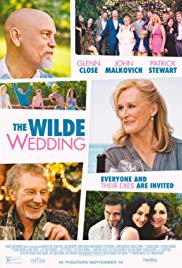
THE WILDE WEDDING
US, 2017, 95 minutes, Colour.
Glenn Close, John Malkovich, Patrick Stewart, Minnie Driver, Grace Van Patten, Noah Emmerich, Peter Facinelli, Jack Davenport, Yael Stone.
Directed by Damien Harris.
Of course, the Wilde of the title refers to the family – but it could well refer to the goings on, the shenanigans at the actual wedding.
One of the granddaughters of the family has a camera and is filming interviews with relatives and guests, filming the proceedings. And, she has quite some proceedings to go on with. Glenn Close plays a celebrated actress who is marrying for the fourth time, a novelist, played by Patrick Stewart who, nevertheless, still has a roving eye. Also invited to the wedding is her first husband, father of her children, an actor, played with sometimes puzzled charm by John Malkovich.
Add to the mix the various sons and their wives, some loving, some hostile, scenes being created around the house and at unpredictable times. Should she marry? Should she not marry? Is she in love with her next husband? He with her? What is the role of the children, their squabbles, making peace in public but fighting behind the scenes?
And, the final solution relies somewhat on T.S. Elliot’s remark that in my end is my beginning!
1. An American comedy of manners, 21st-century? Good manners, bad manners?
2. The title, the irony of the family name? The wedding focus? The family focus?
3. The house on the grounds, the interiors, the pool, the grass and lawns? The wedding location? The musical score?
4. Mackenzie, talking to camera, her making her documentary? Explanations, styles, the various shots, the sequences, the interviews, Eve and Laurence, her father and uncles, cousin? Her infatuation with her cousin, the swimming sequences? The speculations for the interviewees – questions about the first loves?
5. Eve, Mackenzie giving the potted history, the meeting with Eve, Laurence, acting, marrying, television program, her becoming a star, the divorce, the suggestion of a birdcage for his next wife, to keep her in? Her subsequent marriages? The three sons, the bonds with their mother? Meeting Harold, falling in love, deciding to marry him? Laurence and his presence, the ease between them despite the disputes? The relationship with Harold? Her confiding in Laurence, the morning, the hesitations, his betrayal, calling off the wedding? On the balcony, Laurence proposing, her acceptance, happy and the future?
6. Laurence, his career, his manner manners, manner of talking, the marriage to Eve, the songs, his attitude towards family? The touch of the cynic, moving to a romantic? His observations, the discussion with Harold, the night before with Eve? His speech to the guests, proposal, and his knees, acceptance?
7. The sketch of their sons, James, his roving eye, phoning about the bus driver? His fall, hurting his leg? Rory, the story of his marriage, estrangement from Priscilla, his skill as a musician, composer, her successful career, the divorce? The son, filming him dancing? Priscilla, pushy, her performance, the song for Eve? Rory, with Priscilla, the encounter with Clemmie, the day after, the future? Ethan, his daughter, his flirting, the girl making the mask, going to sleep, his smashing it?
8. Harold, his being a writer, his life, his daughters, their friends? At the house, enthusiastic, discussions with Laurence, with Eve? His motives? Drinking, the night with the girlfriend? The daughter’s reactions? His being ashamed, leaving?
9. The visiting friends, the pool? The guests for the wedding?
10. Dylan, the cousin, comments about cousins, the infatuation with Mackenzie?
11. An American family, 21st-century family, mores and morals?
Published in Movie Reviews
Published in
Movie Reviews